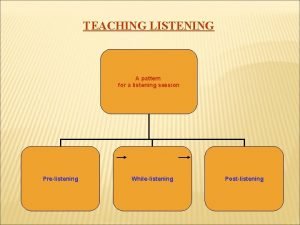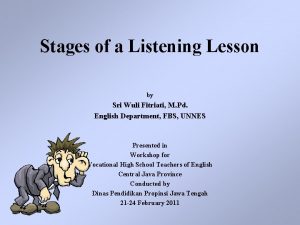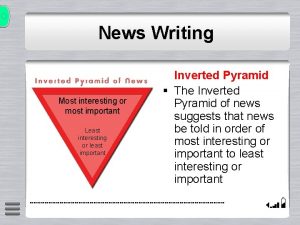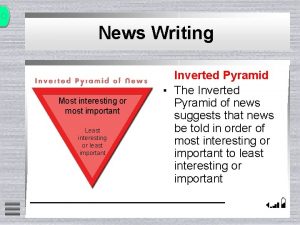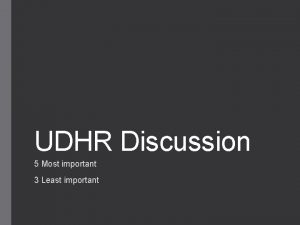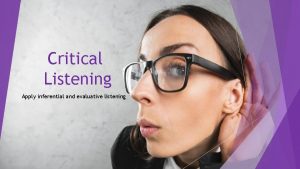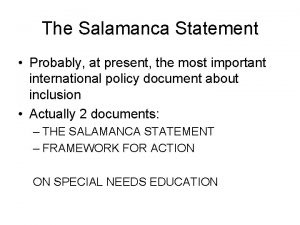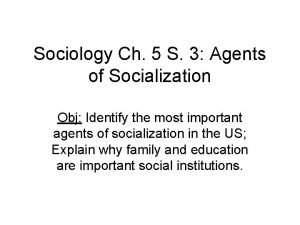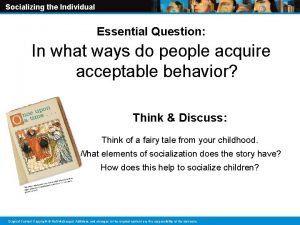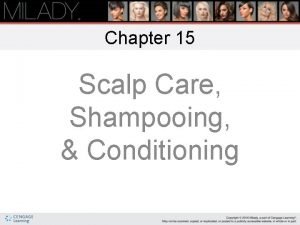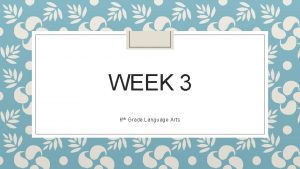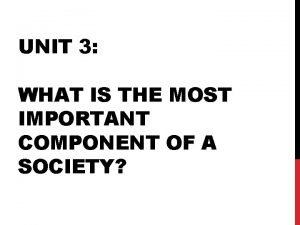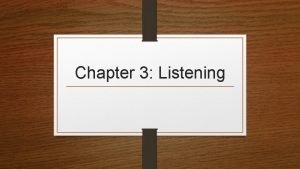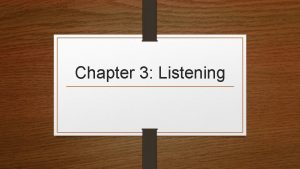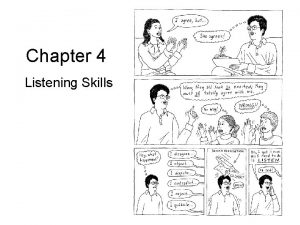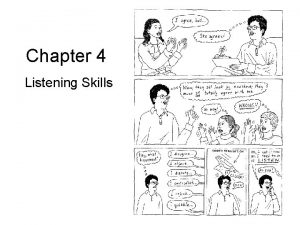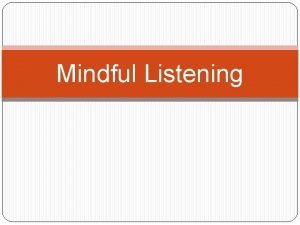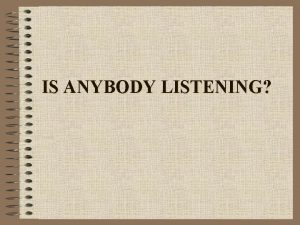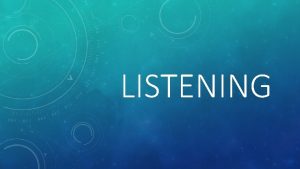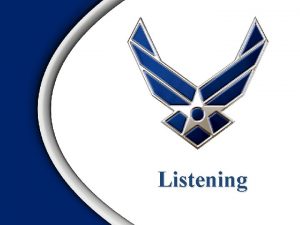CHAPTER 4 LISTENING One of the most important



































- Slides: 35

CHAPTER 4 LISTENING One of the most important things you can learn to do well!.

LISTENING VS. SPEAKING • People prefer speaking, • But spend most of their time listening (53%). • Many people have short attention spans. • Impatience sometimes leads us to assume we know what someone will say next.

THINK ABOUT THIS… Why do you think nature has given us one tongue, but two eyes and ears?

HEARING VS. LISTENING Hearing: an automatic reaction of senses and nervous system to sound. Listening: the process of understanding what was said.

Assuming what someone will say next is WRONG …and a bad assumption!

TYPES OF LISTENING • ACTIVE – when the listener participates and shares in the communication process by guiding the speaker toward common interests • PASSIVE – the listener does not share in the responsibility, nor involve himself in the communication process.

TYPES OF LISTENING • APPRECIATIVE: • DISCRIMINATIVE: singling out one sound from • EMPATHIC: encourages people to talk freely • CRITICAL LISTENING: used to analyze used to enjoy pleasurable sounds like music, song or nature. a noisy environment without fear of embarrassment evaluate a message for logic and value

WHAT TYPE OF LISTENERS ARE THESE?

WHY LISTENING MATTERS • • • The good listener is popular everywhere. You will make more friends by listening than by speaking! Good listeners get better jobs! (Fortune magazine rates listening as the top management skill needed for success in business) • • Good listening says to the talker –“You are important, and I am interest in what you have to say. ” Will get better grades

HAVE A LITTLE SPARE TIME? • We speak at 120 to 180 words a minute • BUT, we can LISTEN to 400 to sometimes as much as 800 words per minute. Because our brains can process words more quickly than they are delivered, we have to learn to use the “rate gap” to improve our listening skills

LET’S LOOK AT A TYPICAL SCENARIO 1. You are talking to your teacher 2. Teacher mentions your best friend 3. You STOP listening to the rest of what she’s saying and think about your weekend plans 4. You remember the teacher is still talking, but you didn’t hear what she said 5. You missed the critical part of her message 6. And, now you are too far behind to catch up; you zone out

THE 7 WORST HABITS OF LISTENING • Tuning out dull topics • Faking attention • Becoming distracted • Criticizing delivery or physical appearance • Jumping to conclusions • Overreacting to emotional words • Interrupting

LISTENING TO A SPEECH Knowing how speeches are usually organized, can make us smarter listeners because we will be sure to listen most intently when it matters the most. Here’s how to listen during the three major parts of a speech……

LISTENING TO A SPEECH The Beginning… • • • Many people think this is the best time to listen This is NOT such a great strategy It’s the most entertaining, but not the most important Does that mean you are not supposed to listen to the first part of anyone’s speech? ?

LISTENING TO A SPEECH NO !!!! ü But it does mean - don’t get lost in the speaker’s jokes, stories, etc. ü Listen carefully to hear the MAIN IDEA of the speech ü This is what you should be doing at the beginning of a speech!

LISTENING TO A SPEECH The Middle… Be a critical listener especially during the middle of the speech. The middle of the speech is the best time to: • • test the strength of the speaker’s message question how the speaker defends his or her assertions

LISTENING TO A SPEECH The End… Always listen intently during the end of the speech for appeals to persuade. How do you know that a speech is coming to an end? ?

LISTENING TO A SPEECH The End… The end of the speech is the best time to: • Recognize if the speaker is misleading you • Ask yourself if s/he has earned whatever acceptance s/he is asking you to give Propaganda – words designed to distort the truth

HAVE A LITTLE SPARE TIME? • We speak at 120 to 180 words a minute • BUT, we can LISTEN to 400 to sometimes as much as 800 words per minute. Because our brains can process words more quickly than they are delivered, we have to learn to use the “rate gap” to improve our listening skills

Listening. Listening. Listening. Listenin Listening. Listening. Listening. Listening. Listenin Listening. Listenin Okay, so how do we improve our listening?

PRE LISTENING • Build your background knowledge on subject before listening • Have a specific purpose for listening and attempt to ascertain speaker's purpose • Minimize distractions

DURING LISTENING • Give complete attention to listening • Constantly check your understanding of message by making connections, making and confirming predictions, making inferences, evaluating, and reflecting • Be flexible note takers • Take fewer, more meaningful notes • Separate message from speaker

AFTER LISTENING • Follow up on presentation by reviewing notes, categorizing ideas, clarifying, reflecting, and acting upon the message

IMPROVING YOUR LISTENING • • Taking notes will improve your listening. Because we listen faster than we can speak, we can use the “spare time” to: EXPLORE ANALYZE REVIEW SEARCH (FOR HIDDEN MEANINGS)

• Explore – think ahead of the speaker • Analyze – consider carefully what’s being said; look at it from any angles • Review – every so often, mentally run over the points already made. • Search – be alert of hidden meanings, innuendos, sometimes expressed through nonverbal communication

LISTENING IN THE WORKPLACE The Most Common Listening Situations On The Job: 1. ) Being introduced to others – proper etiquette 2. ) Accepting criticism 3. ) Asking for explanations 4. ) Taking notes

WHY DO WE NEED TO LEARN THIS? ? Poor listening can lead to…. o Unresolved problems o Overlooked solutions o Weak decisions o Costly mistakes

INTRODUCTIONS • Remembering people’s names is essential!!! • • • Repeat the name 2 or 3 times in conversation Relate the person’s name to something familiar Develop determination to remember

INTRODUCTIONS • Here’s how you introduce people: • Introduce the OLDER, more senior, or more powerful person to the other FIRST • “President Bush, I would like you to meet my husband Paxton. ” • “Mr. Burnett, I would like to introduce you to my mom. ”

INTRODUCTIONS • If you are being introduced: • • • make eye contact, shake the person’s hand, Say something like, “ A pleasure to meet you, Mr. Lachey. ” Now, let’s practice! (use handout)

ACCEPTING CRITICISM • • It stinks! But, you will be better at what you do. Don’t take it personally Put yourself in the other person’s shoes Don’t fixate on what you did in the past, do what your employer expects in the future.

GIVING CRITICISM On your own piece of paper, write a constructive way to tell a fellow employee that their work was not up to par. You have 5 min. Be prepared to read your criticism aloud to the class and turn it in for a grade.

ASK FOR EXPLANATIONS • • Don’t pretend you know everything…your employer doesn’t expect that of you. But they do expect you to ask for help when you need it. • “Would you please clarify that? ” • “Could you be more specific? ” • “I think I misunderstood you…”

TAKING NOTES • • • YOU understand remember more Always carry a notepad and pen Write quickly…avoid complete sentences

So, what do we do with this information? ? MAKE THE COMMITMENT, AND PRACTICE BECOMING A GOOD CRITICAL LISTENER. START TODAY!
 Listening pattern
Listening pattern While listening stage
While listening stage From most important to least important in writing
From most important to least important in writing Inverted pyramid in news writing
Inverted pyramid in news writing Least important to most important
Least important to most important Water is one of the most important
Water is one of the most important Active listening passive listening
Active listening passive listening Evalutavive listening
Evalutavive listening One empire one god one emperor
One empire one god one emperor Little dog run
Little dog run One king one law one faith
One king one law one faith One empire one god one emperor
One empire one god one emperor One ford plan
One ford plan See one do one teach one
See one do one teach one See one, do one, teach one
See one, do one, teach one Night structure
Night structure See one do one teach one
See one do one teach one One vision one identity one community
One vision one identity one community One vision one identity one community
One vision one identity one community Doctrine and covenants 130
Doctrine and covenants 130 Salamanca statement
Salamanca statement Agents of socialization sociology definition
Agents of socialization sociology definition Resocialization
Resocialization Different parts of body
Different parts of body Imaginary horizontal line in the globe
Imaginary horizontal line in the globe 2 most important commandments
2 most important commandments The most important things in life essay
The most important things in life essay Shampooing encompasses three different processes
Shampooing encompasses three different processes What were mansa musa's most important achievements
What were mansa musa's most important achievements The most important night of melanie's life
The most important night of melanie's life The most important component
The most important component Most important organelle
Most important organelle Most important method of capillary exchange
Most important method of capillary exchange Existential universal statement examples in math
Existential universal statement examples in math Element of a plot
Element of a plot What is the most important physical property of alcohol?
What is the most important physical property of alcohol?
